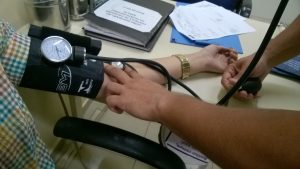Cloud technology emerged in the healthcare industry with a handful of benefits. Not only has it enabled CIOs to save money by decreasing the need for more infrastructure, it has also proved to be a low-cost solution that helps clinicians provide easier and better care for patients. In fact, recent research predicts that global healthcare organisations will increase their spending on cloud computing services by 20% a year until 2020, when the value of the investments will be more than £8.3bn.
[easy-tweet tweet=”Global healthcare organisations predicted to increase their spending on cloud by 20% a year until 2020″ user=”EXTR_UKI” usehashtags=”no”]
Back in 2013, UK health secretary Jeremy Hunt challenged the NHS to be entirely paperless by 2018 in a bid to “save billions, improve services and help meet the challenges of an ageing population”. One element of this plan was to make everyone able to access their own health records online by March 2015. Whilst we have seen some UK hospitals emerge as innovators and leaders in this initiative, there has also been a high level of reluctance from healthcare organisations to move entirely online given the risks involved in cloud migration.

Despite the wealth of benefits cloud technology can offer healthcare professionals and their patients, the challenges involved have proven to be a stumbling block to moving forward with the NHS’s plans to go paperless.
Here’s a look at some of the specific challenges healthcare organizations are facing when adopting cloud solutions and, more importantly, how these hurdles can be overcome:
- Compliance: With an online, connected healthcare system, now more than ever it is crucial clinicians work with vendors who understand and adhere to the 1998 Data Protection Act as well as the more specific healthcare acts such as the NHS Act 2006 and the Health and Social Care Act 2012. Failure to follow these could lead to not only embarrassing hacks, but also potentially expensive and costly legal proceedings.
- Privacy & Security: As the health sector out stripped all other industries in last year’s Information Commissioner’s Office report with 747 individual data breaches, there is clearly an issue with privacy and security. To try and lower the number of incidents, clinicians are turning more and more to network providers to secure data. With the internet providing a quick and easy distribution channel for information, even the tiniest of data breaches can suddenly become national headline stories.
- Evolving Role of IT: With the explosion of devices and technology in healthcare, there has also been an increase in patient data. In turn, this has placed heightened demands on IT to provide better performing cloud solutions in a more agile environment. Today’s healthcare IT professionals are grappling with a shift in their responsibility from “keepers of the infrastructure” to “managers of application service delivery.”
clinicians are turning more and more to network providers to secure data
While there are undoubtedly challenges with cloud-based technology, it also presents an immense opportunity for hospitals to save money, decrease their infrastructure and provide better patient experiences. However, doing so requires organisations to have complete visibility and a clear understanding about what is taking place on their networks.
Network-powered application analytics solutions allow clinicians to create policies based on network data. More importantly, these solutions can give clinicians and their teams a bird’s eye view into their network, ensuring they have visibility into all network applications and activity. This means they can see who’s utilizing the network and what information they are accessing, so that patient data is kept private and only shared with authorised viewers.
patient data is kept private
In addition, network-powered application analytics solutions are simplifying the role of IT. As IT professionals shift into the role of “manager of application service delivery,” new analytics solutions allow them to view and manage all network devices and activity from one centralised location.
The benefits of cloud technology for healthcare organizations cannot be overlooked; however, unleashing these benefits means overcoming several hurdles. Working with suppliers who understand these demands makes implementation and deployment a seamless operation.
[easy-tweet tweet=”The benefits of cloud technology for healthcare organisations cannot be overlooked” user=”EXTR_UKI” usehashtags=”no”]
Bob Zemke, Director of Healthcare Solutions, Extreme Networks
Bob Zemke is Director of Healthcare Solutions at Extreme Networks. An IT professional with a broad span of experience in healthcare, Bob has over 14 years working both within hospital IT and as a consultant in next generation network design, deployment and management. He is co-author of a book entitled "WiFi Enabled Healthcare" that is available on Amazon.com.




Comments are closed.